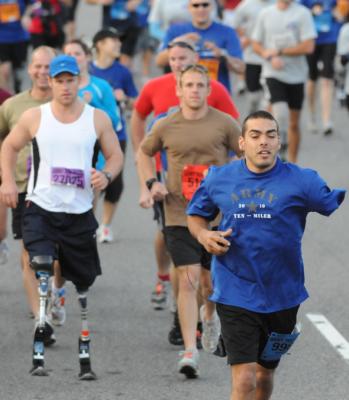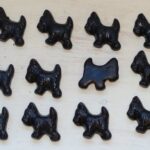Beliefs have the power to create and the power to destroy. – Tony Robbins and here

Can a one-armed man compete in a ten mile race? How about a guy with two artificial legs? They believe they can, and they are doing it. What do you believe you can do?
What does that mean?
This is another short-form, Twitter friendly quote, the entirety of which reads : “Beliefs have the power to create and the power to destroy. Human beings have the awesome ability to take any experience of their lives and create a meaning that disempowers them or one that can literally save their lives.”
This quote is all about beliefs, and the power they have. Beliefs can hold incredible power. How would you like to be in a life-or-death struggle with someone who believed the only way to go to their version of heaven was to die in battle? That belief is part of why the Vikings were so feared, as they had no fear of death (in fact, a glorious battlefield death was considered quite a promotion).
The belief that all is lost, and consequently giving up is referred to in the medical community as “failure to thrive” and can be fatal. The belief of “I can survive” vs “I cannot possibly survive” is often the only explanation for why one person survived and others did not in the exact same disaster.
Some beliefs are sometimes internally based (faith), but many beliefs are based on observations of past events. If you have failed every time you tried something, pretty soon you might start to believe it cannot be done. Good thing Thomas Edison didn’t believe that, or you’d be reading this by candle light, right? No, not really.
Why are beliefs important?
While I have discussed beliefs before (here and here), I’d like to take this quote as an opportunity to address beliefs in general. Beliefs are an essential part of who we are, and what we think the world is (or should be). Sometimes the beliefs are based on faith, but most often, in my experience, I find that the beliefs are based on actual experiences.
The results of these actual experiences will be modified by our brains to fit within our beliefs. If the events aren’t changed to match our beliefs, then our beliefs must change to match the events. While it is possible to change our beliefs based on actual event outcomes, it’s not the usual route I have seen taken by most people (myself included).
Where can I apply this in my life?
What do you believe about yourself? For the longest time, I thought I was a failure, who never followed through. That was mostly from my grandfather, who was a self-made man, and a meticulous Type-A person. I was a scatter-brained teen with no ability to focus (ADD with Oak Leaf Clusters). After hearing the litany of incomplete projects, I started believing it.
Once I started believing that I was a failure who couldn’t complete a task, my ability to complete anything dropped to just about zero. I had a built in excuse. It’s kind of like two Cubs fans arguing whether the Cubs will be mathematically eliminated from winning the division before or after the All-Star break. That’s not the way champions talk, and even the fans should be better than that (being a life-long Cubs fan, I’ve heard them all).
The human brain is, as much as anything, a deletion filter. Quick, what is on your neck and shoulders? Odds are there is a shirt there, but do you really feel it? Most of the time you don’t, right? That’s your brain eliminating data that is not needed. If you believe that you never complete anything, your brain will do the best it can to ignore any case of you actually completing something.
Think about that, never completing anything. Never complete a sentence? Never complete a meal? Never complete a thought? Surely you complete some of those every once in a while, as I know I did. But somehow, I managed to ignore the data that contradicted my beliefs. Even when I finished highly complex tasks (like building a safe out of 2×4’s and a functioning plexiglass combination dial system), I still believed the lie I was telling myself.
Is such a belief about themselves going to disempower someone? I would tend to think so. However, once you understand that you have had both successes and failures, and will now be focused on the successes instead of the failures, you can start to turn things around. I have even taken the time to finish some of the projects I began decades ago, to help put an end to the “failure” myth.
The other side of the coin include people who have overcome phenomenal obstacles. Earlier this weekend, I saw a segment on a guy (Matt Long) who was run over by a bus and injured so severely that the doctors gave him a 1 in 20 chance to survive. He recently completed the New York City Marathon. I wonder if he believed he was a failure, or if his belief in himself might have helped him overcome the obstacles in his path?
We all have things happen to us. The stories we tell ourselves about how and why are what fuel our beliefs. If we argue for our weaknesses, who will argue for our strengths? We must allow for our weaknesses, but move on despite them. If we can believe that we can, we’re half way there. If we believe that we cannot, we’re already doomed. Choose your beliefs wisely, they will impact your trajectory in life.
From: Twitter, @motivatquotes
confirmed at : http://www.brainyquote.com/quotes/quotes/t/tonyrobbin147773.html
Photo by familymwr






